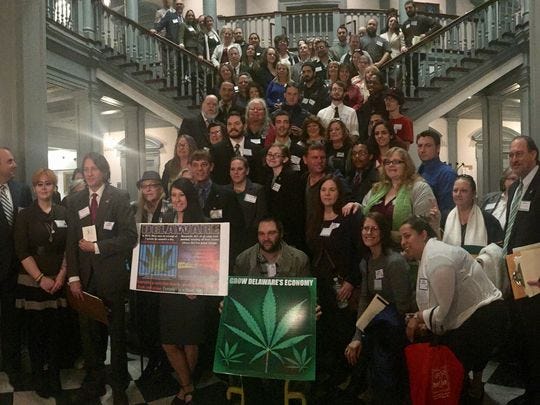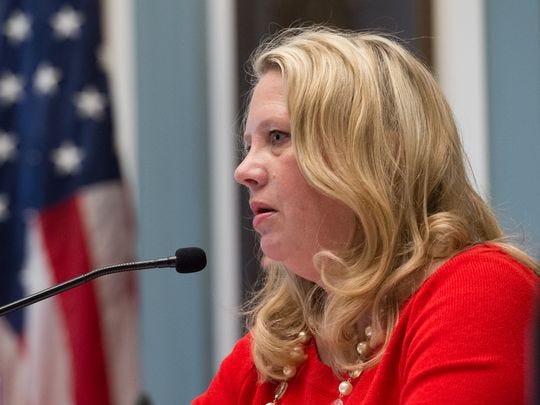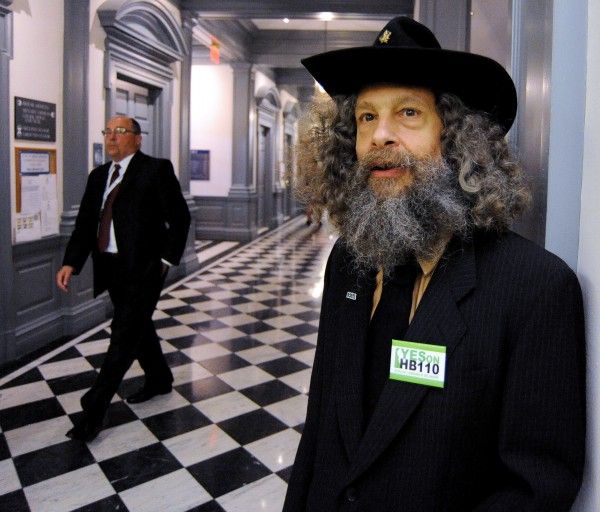Marijuana legalization debate keeps burning in Delaware
The debate over legalized marijuana in Delaware is not going away despite state lawmakers shelving an effort to allow recreational cannabis sales to adults.
The issue was thrust to the forefront of public policy debates in Delaware this year as advocates showed up in force at town hall meetings, organized lobbying events in Dover eventually got the ear of Gov. John Carney in a special meeting to discuss the legalization. Ultimately, advocates had to settle for legislation creating a task force to study the issue ahead of the General Assembly's 2018 session.
While the legislation proposed earlier this year that would actually regulate and tax a recreational marijuana industry in Delaware was set aside, the proposed law will be on legislators' agenda when the General Assembly reconvenes in January.
State Sen. Margaret Rose Henry, D-Wilmington, who sponsored the legalization legislation, is confident the task force will win the votes necessary to pass her bill next year.
"In the end, we are going to come up with something we can all live with," Henry said. "We will definitely see it in 2018. I have no doubt about that."
However, some opposed to legalization say the task force is merely an effort to allow the recent surge in public pressure around the issue to subside before the General Assembly reconvenes next year.
"I think the task force was sort of a placating measure to sort of stop the madness right now of legalization," said Senate Minority Leader Gary Simpson, R-Milford. "I just think it is too soon right now."
The taskforce will be comprised of a collection of state government administrators, public safety officials, politicians, medical experts, advocates and detractors. Its goal is to study models for regulation and taxation of recreational marijuana, reporting its findings to lawmakers by Jan. 31.
Henry said the task force will serve as an opportunity to augment the legalization legislation to address opponents' concerns over how regulation would work.
The taskforce will get into the fine details of legalization including implications for banking, substance abuse prevention, proper packaging and how to combat impaired driving.
Among other potential problems, opponents have raised questions over how local banks would deal with proceeds from recreational sales, how police will test the sobriety of suspected stoned drivers and how to keep marijuana away from those who are not 21 years old.
Henry said the creation of the study group is similar to the path used to legalize medical marijuana in Delaware.
"Anytime you do major policy things, it takes a long time to get people comfortable with the concept," Henry said.
Opponents say the study group does not mean legalization is a foregone conclusion. AAA Mid-Atlantic has been one of the most vocal opposition groups raising concerns about how legalization would affect highway safety.
"They are an optimistic group and (legalization advocates) truly believe in what they are trying to accomplish, but I don't believe this task force is a step in that direction," said Ken Grant, public affairs manager for AAA Mid-Atlantic. "It is exactly what we have been calling for from the beginning: a more in-depth look at the issue."
Detractors have argued that legalization would erode Delaware's safety on roads and increase medical costs. While children would not be allowed to use marijuana under the bill, those in opposition also worry the measure could change young people's perceptions about marijuana's safety.
Grant said the task force will allow for more thorough vetting of how legalized marijuana will affect the state. Both sides have accused their opponents of peddling misleading studies and statistics.
"The whole concept of legalization for recreational use is a lot more complex than some would like to think it is on both sides," Grant said. "The taskforce really has its work cut out for it."
Zoe Patchell, who leads the Delaware Cannabis Advocacy Network, welcomes the "honest dialogue" she hopes the task force will host. She said her group will continue to make their argument that legalization will raise tax revenue, reduce public law enforcement costs and can be done responsibly.
The study group will have three seats dedicated to marijuana reform activists.
"We are pretty optimistic going into the next session," Patchell said. "We just need people to contact their elected officials if they support this so they can hear from constituents."
Patchell's group is planning a number of outreach events through the end of the year and will host a marijuana-focused lobby day in Dover the first week the General Assembly returns in January.
Regardless of what comes from the study group, the legalization effort faces a steep hill to become law.
The measure requires backing from 14 senators and 28 representatives — a two-thirds vote in both houses. Bi-partisan support will be required.
Simpson said he "doesn't see" his Republican caucus ready to vote in favor of legalization. He said there needs to be more time to study the long-term effects in states that have legalized recreational marijuana.
WATCH: Marijuana legalization proponents meet with Gov. Carney
RELATED: Dueling weed agendas head to Legislative Hall
"Give it another two or three years, the social scientists and health scientists can look at the overall effects. If there are none, I'd think it would pass," Simpson said. "By rushing into it, we could be doing more damage to our citizens than benefits."
Patchell said her group is planning to emphasize what they see as the agricultural benefits of legalization for Kent and Sussex counties — counties where Republicans derive the most of their influence in state politics.
Her group has argued legalization would lead to dozens of new small businesses and thousands of new job opportunities.
"It has a strong agricultural grounding with the cultivation and the manufacturing and different things," Patchell said. "These jobs and these businesses would be essential to Kent and Sussex counties."
More than 50 supporters of the proposed Delaware Marijuana Control Act pose for a photo during a recent Lobby Day organized by the Delaware Cannabis Advocacy Network. (Photo: Courtesy of Delaware Cannabis Advocacy Network)
Despite the high legislative hurdle, Henry said public opinion will eventually drive the effort through. A poll conducted by the University of Delaware last year found that more than 60 percent of state residents support full legalization of marijuana.
"The majority of Delawareans want it," Henry said. "The people want it. You can't fool them."



